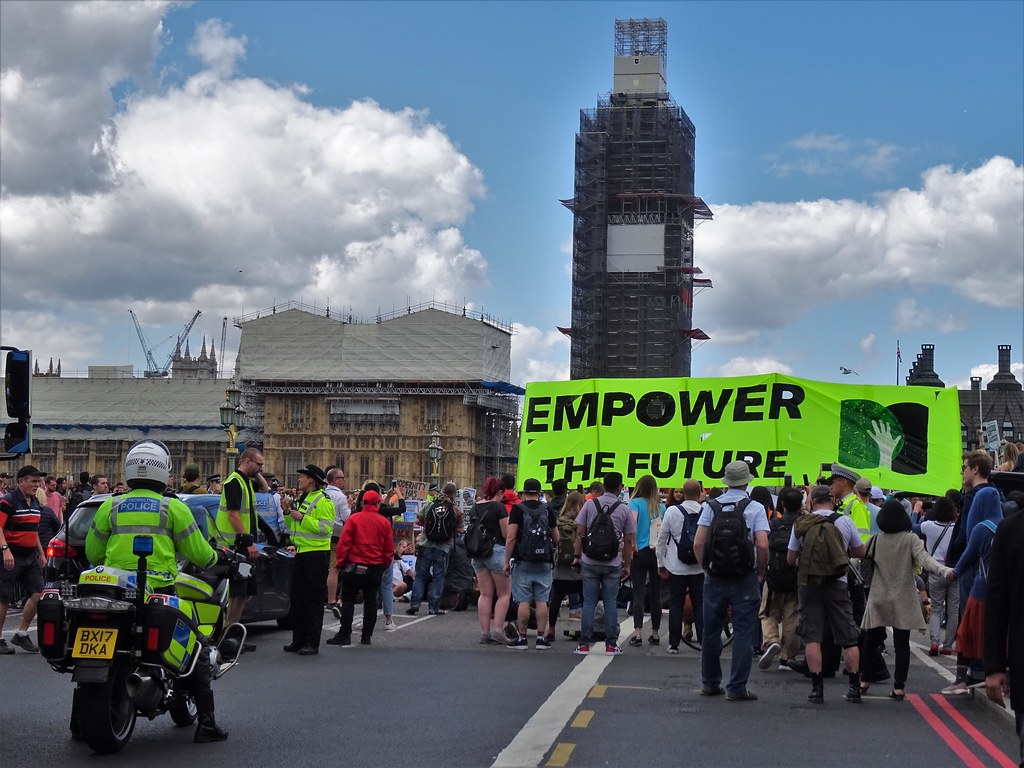LONDON — The UK is set to become the first G7 country to legislate for net zero emissions by 2050. The minimum 100% reduction target will be written into law on Wednesday through an amendment to the Climate Change Act 2008, which previously targeted an 80% reduction by 2050.
Theresa May is signing off new policy in the time before her departure as prime minister: “This country led the world in innovation during the Industrial Revolution, and now we must lead the world to a cleaner, greener form of growth.”
The move follows advice provided by the UK’s climate change advisory board The Committee on Climate Change (CCC).
The recent activism and declaration of a climate emergency on May 1st are very likely to have influenced the decision, as it seems to be in contrast to the conservative’s controversial record on the issue, such as measures against wind and solar power, and a third runway at Heathrow Airport.
Earlier in the week, the government dismissed chancellor Philip Hammond’s claim that the target would cost £1tn and result in spending cuts. It said the cost would “fall within our existing spending plans”.
The chancellor did not factor in the cost of not acting on climate change. Furthermore, it is expected to create many new jobs, improve energy security, result in cleaner air, and make the UK an even more attractive place to live, work, and invest.
The UK’s Secretary of State for Business, Energy and Industrial Strategy Greg Clark said: “Almost 400,000 people are already employed in the low-carbon sector and its supply chains across the country. Through our modern Industrial Strategy we’re investing in clean growth to ensure we reap the rewards and create two million high quality jobs by 2030.”
There will be a review in 5 years time so that the UK does not “face unfair competition”. The target already falls short of limiting global warming to 1.5°C, and global targets are only expected to become increasingly ambitious, so it’s unclear why such a review would be needed.
The creative carbon accounting problem
The CCC released a statement and noted that the government “has not yet moved formally to include international aviation and shipping within the target”. Excluding aviation and shipping, the UK’s emissions have been falling, but including these sectors, emissions have been steadily on the rise. Failure to include aviation and shipping could undermine the reality of the net zero target.
Prior to the announcement, the Financial Times reported that the government was trying to “fiddle the figures”. MPs were planning to take 88 megatonnes of surplus emissions reductions made between 2008-2012 and bring them forward into the 2023-2027 period.
International carbon credits have been kept “as an option”, but the government does not “intend” to use them, according to the acting energy minister Chris Skidmore. This would allow the UK to pay to offset its emissions abroad; against the advice of the CCC.
Is net zero by 2050 enough?
The target meets the IPCC’s recommendation of net zero emissions by 2050, however, this is only for a 50%-66% chance of limiting global warming to 1.5°C.
The UK as a developed nation is capable of achieving a far more ambitious target.
Every country on the planet must at least commit to net zero by 2050, but the developing world continues to suffer from energy poverty, and therefore needs to be given some room for growth.
Currently, around 1 billion people worldwide still don’t have access to electricity. In India, up to 270 million people don’t have access to electricity.
Furthermore, as new research emerges [Bamber, J, et al. 2019], it is becoming clear that 2050 as a target for net zero is far too conservative. Research has shown that the 1.5°C limit could be breached as soon as 2030.
It is still possible that the 2050 target could be brought forward. Mass activism is sure to continue until the target shifts to at least 2030. The effects of climate change will also become increasingly dire. The concern is that governments may not fully understand the extent of the problem until disaster strikes, at which point it could be too late to act.
It remains to be seen whether today’s legislation will translate into effective policy, and whether the targets will actually be met. I advocate the use of Iterative Risk Management to ensure targets are met on a year-by-year basis: additional policy would be introduced each year to bring emissions in line with the overall target, this would prevent the build-up of an impossible surplus. Hitting targets in the short term would guaruntee that the long term targets are met, and there is no margin for error in context of the climate crisis.
Nevertheless, it’s a step in the right direction, and will be an important foundation for introducing the hard policy necessary to reach net zero. Even greater ambition is needed to bring the UK in line with the Paris Agreement targets of 1.5-2.0°C, especially as the world’s carbon budget becomes ever more scarce.


 Science 6 years ago
Science 6 years ago
 Opinion 6 years ago
Opinion 6 years ago
 Science 6 years ago
Science 6 years ago
 Opinion 6 years ago
Opinion 6 years ago
 Politics 6 years ago
Politics 6 years ago
 Opinion 4 years ago
Opinion 4 years ago
 Politics 6 years ago
Politics 6 years ago
 Politics 6 years ago
Politics 6 years ago


